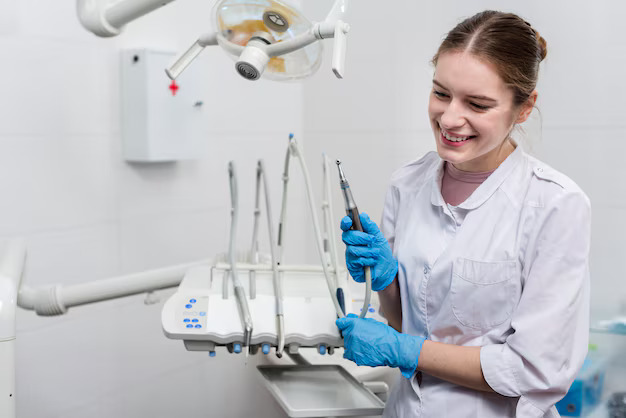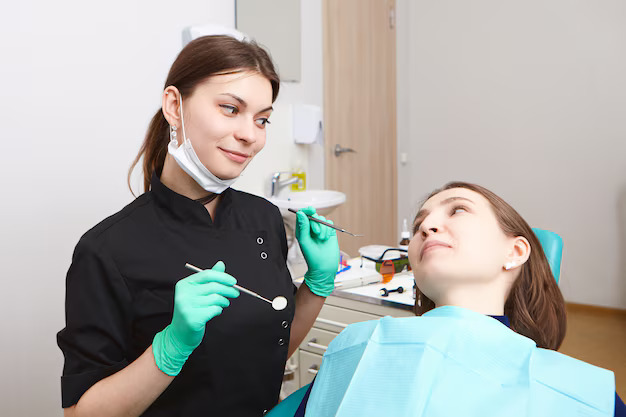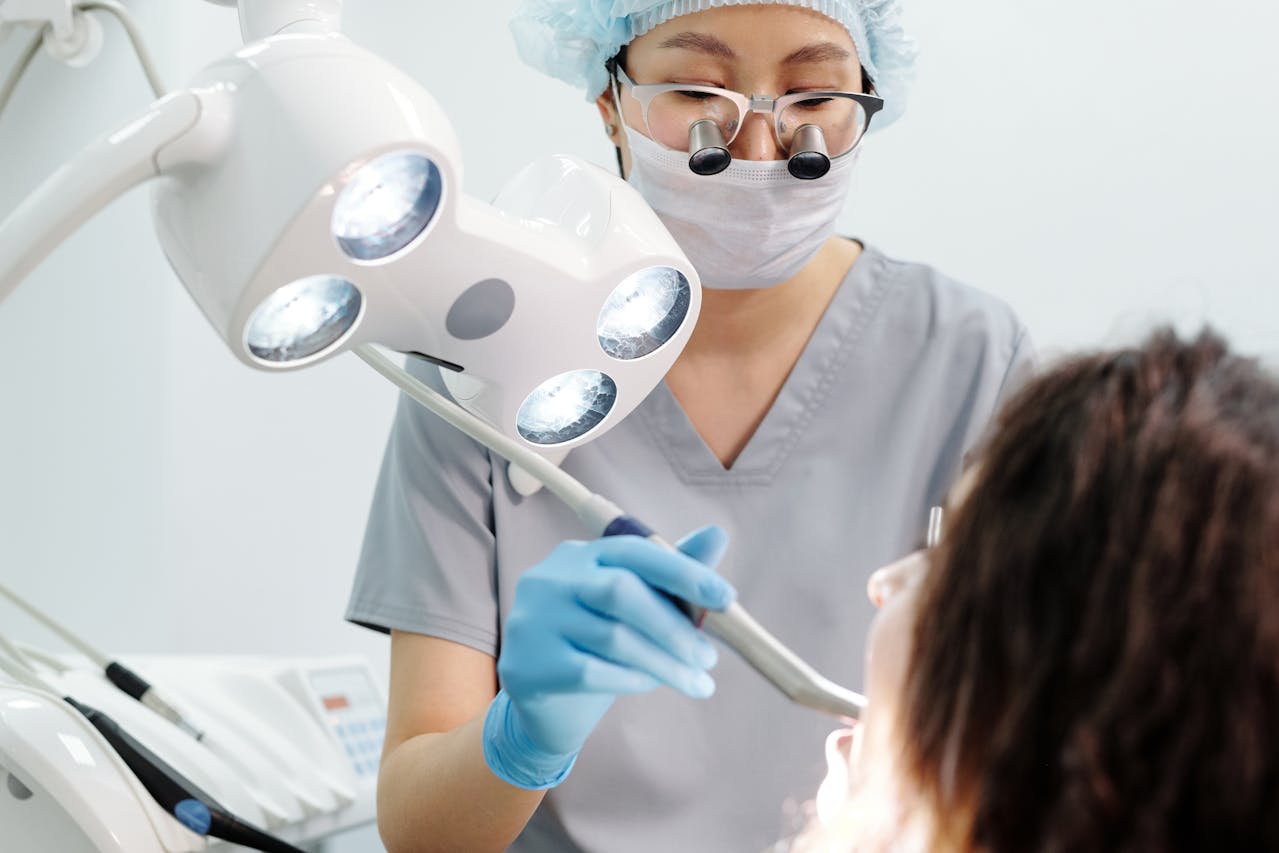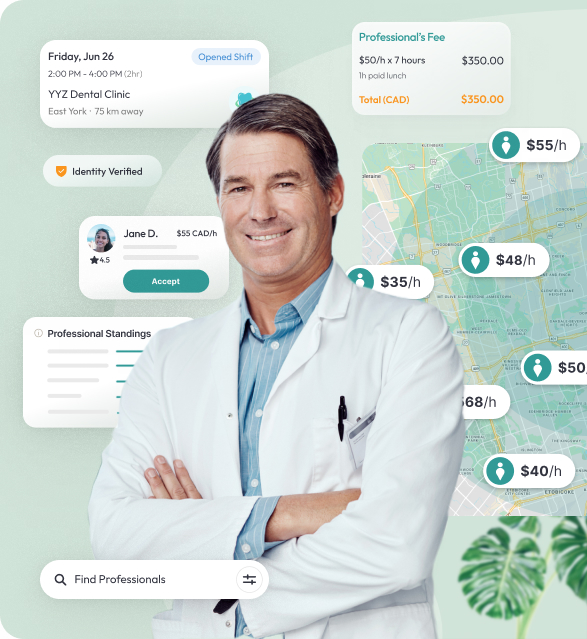Role of Dental Hygienists: Key Responsibilities
Dental hygienists are trained dental professionals specializing in preventive care. They are licensed and certified oral health professionals who are responsible for preventing and treating dental problems and maintaining overall health.
If you are considering a career as a dental hygienist, you must be wondering, what does a dental hygienist do? Don’t worry, this article provides you with everything you need to know about the dental hygiene career, its key responsibilities, qualification requirements, and how they collaborate with dentists. Read on if you don’t want to miss anything!

Understanding the Role of Dental Hygienists
The basic responsibility of a dental hygienist is to provide routine preventive oral healthcare. Statistics show that a career as a dental hygienist is high in demand and is expected to grow rapidly as the population grows older. Dental hygienists work tirelessly to keep your teeth and gums healthy by preventing any oral disorders.
The job outlook seems very promising, with an average annual salary of $100,000. With further technological advancements and increasing demand for dental hygienists, this profession will become more sought after.
Overview of Duties in Dental Practices
The responsibilities of a dental hygienist involve a wide range of treatments and dental hygiene procedures. These dental prophylaxis tasks include:
- Performing routine dental cleaning
- Tooth scaling and root planing
- Taking dental X-rays
- Performing oral health screening
- Reviewing health history and dental charts
- Applying dental sealants
- Providing fluoride treatments
- Offering oral hygiene instructions
- Taking impressions and performing in-office whitening
Contribution to Preventive Dental Care
The role of dental hygienists in preventive dental care is extremely important. They are the frontline providers of preventive oral care with routine cleanings, screenings, and examinations. These preventive measures can significantly reduce the risk of further complications or any serious health conditions. Maintaining good oral hygiene not only keeps dental health at its prime but also minimizes the risk of other health conditions like diabetes and cardiovascular disease.

Primary Clinical Responsibilities
Dental hygienists provide primary oral care to dental patients. Their responsibilities include:
Conducting Initial Patient Assessments
As dental hygienists are responsible for routine dental care, they perform initial oral health assessments to take any history of patients, if they had any treatments done previously, or their health habits to assess any dietary restrictions or allergies. This initial assessment is highly important for future treatment plans and to provide optimal oral healthcare.
Cleaning and Polishing Teeth
Dental hygienists use teeth cleaning techniques and polishing procedures in routine checkups. They use specialized dental instruments to clean plaque and tartar buildup in teeth and calculus from around the gums. This routine cleanup is necessary to ensure optimal dental health and prevent any severe oral health conditions.
Moreover, they provide polishing treatments to enhance the appearance of teeth by removing any surface stains by gentle scrubbing. This ensures you always have a shining smile to brighten up your day!
Applying Protective Treatments (e.g., Sealants and Fluoride)
Dental hygienists also provide protective treatments to prevent any future damage. These treatments include applying a thin plastic layer over the chewing surface of teeth to prevent bruxism that can lead to further decay and tooth damage. Another protective treatment for teeth prone to damage is applying fluoride to make the enamel stronger and prevent it from getting damaged easily.
Patient Education and Support
Dental hygienists are also responsible for educating patients on oral health and at-home preventive care.
Guiding Patients on Daily Oral Care
They often provide patient oral care education by demonstrating best practices for brushing and flossing to maintain and prolong good overall dental health. They also recommend oral hygiene products like mouthwash and toothpaste according to each patient’s dental condition.
Discussing Health Habits and Oral Health
As dental hygienists generally spend more time with patients, they discuss their overall health habits to assess any underlying issues or diagnose oral disease early on, preventing further complications.

Collaborative Duties with Dentists
Dental hygienists often collaborate with dentists to provide the best treatment plans and overall oral healthcare. This ultimate duo in dental practices appears to be very beneficial, combining the knowledge and experience of two different paths.
While we don’t see this collaboration more often, most teams are willing to try this setting. n between dentists and hygienists. This duo can establish an environment that will provide enhanced patient care to dental patients.
Assisting in Comprehensive Care Plans
As we have mentioned earlier, patients spend more time with dental hygienists during routine dental checkups. This enables dental hygienists to build trust and bond with them easily. Due to this rapport, they can detect potential problems early on and collaborate with dentists to create treatment plans accordingly.
Regular communication between hygienists and dentists ensures smooth dental operations by discussing patient concerns, exchanging information, and developing the right treatment plans.
Documenting and Reporting Patient Progress
Dentists often rely on patient charts and history to provide treatments. This task is done by dental hygienists during initial oral health assessments and periodontal charting. Dental hygienists provide complete patient history, report any serious concerns, and communicate patient desires to dentists. And similarly, dental hygienists rely on dentists for guidance and oversight of clinical issues. In short, this collaboration is a win-win situation.
Essential Skills and Qualifications
Dental hygienists’ career is estimated to grow 11% from 2020 to 2030, with 15,600 openings projected yearly. This means choosing this as your career path is highly rewarding. But what do you need to become a certified dental hygienist? Let’s find out!
Required Certifications and Licences
To become a dental hygienist you need a minimum of 3 years as of today. However, a four-year graduation from an accredited program is typically more rigorous and comprehensive, offering a deeper curriculum that better prepares individuals for advanced career opportunities This training involves general education credits, dental hygiene courses, and hands-on clinical work.
Interpersonal Skills for Patient Interactions
Soft skills are as important as clinical skills for dental hygienists. They provide patient care and collaborate with other dental professionals which makes them highly dependent on interpersonal skills. Here are the essential interpersonal skills every dental hygienist must have for better patient interactions:
- Effective Communication: a dental hygienist must be able to explain complex dental hygiene procedures and concepts in simplified form to bridge the gap between dental jargon and patient understanding. This way patients will be able to understand their options and the importance of current treatment plans.
- Listening Skills: Listening is crucial for dental hygienists to understand a patient’s concerns and provide relevant feedback addressing their fears. This offers a more personalized experience enhancing their satisfaction.
- Empathy: This is important to establish a bond with the patient and connect with them emotionally, especially with patients having high levels of anxiety.
Conclusion: Dental Hygienist’s Role in Healthier Smiles
Dental hygienists play a critical role in providing preventive dental care, contributing to healthier smiles and overall well-being. Their career outlook is highly promising, making it an excellent field for aspiring professionals.
If you’re a clinic looking to expand your team with skilled dental hygienists, TempFind is here to help. Find a specialist for your practice today and ensure your patients receive the best possible care!




